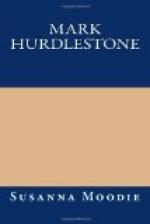CHAPTER II.
The steel strikes fire from
the unyielding flint:
So love has struck from out
that flinty heart
The electric spark, which
all but deifies
The human clay.—S.M.
About two years after Algernon Hurdlestone left the Hall, a widow lady and her daughter came to reside at Ashton, and hired a small cottage, pleasantly situated at the back of the park.
Mrs. Wildegrave’s husband had been engaged in the rebellion of 1745; and his estates, in consequence, were confiscated, and he paid with his life the forfeit of his rashness. His widow and child, after many years of sorrow and destitution, and living as dependents upon the charity of poor relatives, were enabled to break through this painful bondage, and procure a home for themselves.
An uncle of Mrs. Wildegrave’s, who had been more than suspected of favoring the cause of the unhappy prince, died, and settled upon his niece all the property he had to bestow, which barely afforded her an income of fifty pounds a year. This was but a scanty pittance, it is true; but it was better than the hard-earned bread of dependence, and sufficient for the wants of two females.
Mrs. Wildegrave, whose health had been for some years in a declining state, thought that the air of her native place might have a beneficial effect upon her shattered constitution; and as years had fled away since the wreck of all her hopes, she no longer felt the painful degradation of returning to the place in which she had once held a distinguished situation, and had been regarded as its chief ornament and pride.
Her people, save a younger brother of her husband’s, who held a lucrative situation in India, had all been gathered to their fathers. The familiar faces that had smiled upon her in youth and prosperity, in poverty and disgrace, remembered her no more. The mind of the poor forsaken widow had risen superior to the praise or contempt of the world, and she now valued its regard at the price which it deserved. But she had an intense longing to behold once more the woods and fields where she had rambled in her happy childhood; to wander by the pleasant streams, and sit under the favorite trees; to see the primrose and violet gemming the mossy banks of the dear hedge-rows, to hear the birds sing among the hawthorn blossoms; and, surrounded by the fondly-remembered sights and sounds of beauty, to recall the sweet dreams of youth.
Did no warning voice whisper to her that she had made a rash choice?—that the bitterness of party hatred outlives all other hate?—that the man who had persecuted her young enthusiastic husband to the death was not likely to prove a kind neighbor to his widow? Mrs. Wildegrave forgot all this, and only hoped that Squire Hurdlestone had outlived his hostility to her family. Sixteen years had elapsed since Captain Wildegrave had perished on the scaffold. The world had forgotten his name, and the nature of his offence. It was not possible for a mere political opponent to retain his animosity to the dead. But she had formed a very incorrect estimate of Squire Hurdlestone’s powers of hating.




